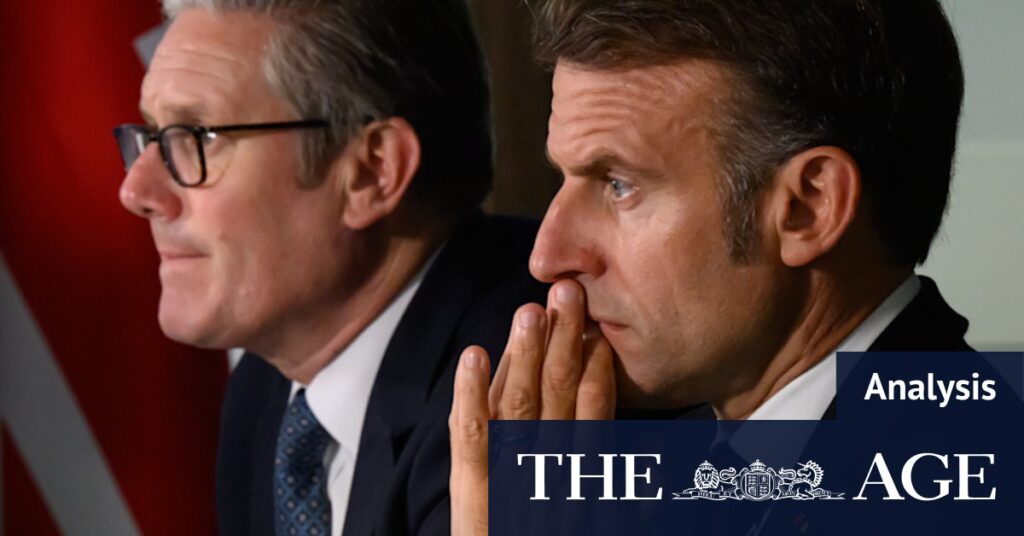
In a week marked by intense diplomatic activity, global leaders have taken significant steps regarding the Israel-Palestine conflict, risking a potential backlash from former U.S. President Donald Trump. British Labour leader Keir Starmer’s call to Israeli Prime Minister Benjamin Netanyahu set the stage for a series of international maneuvers aimed at addressing the ongoing humanitarian crisis in Gaza and the broader quest for a two-state solution.
Starmer’s conversation with Netanyahu, though officially described in neutral terms, reportedly did not sit well with the Israeli leader. Netanyahu accused Starmer of appeasing Hamas, a sentiment not widely shared among global leaders. Even Trump, traditionally a staunch ally of Israel, appeared unperturbed by Starmer’s actions, telling reporters aboard Air Force One that the UK’s alignment with France was acceptable, though not necessarily agreeable.
International Efforts for Peace
As diplomatic debates focused on statehood, urgent discussions centered on humanitarian aid. United Nations Secretary-General Antonio Guterres highlighted the dire situation in Gaza, warning of a looming famine. According to the UN, over 20,000 children in Gaza are suffering from acute malnutrition, while the World Food Program reports that more than 500,000 people face famine-like conditions.
“Palestinians in Gaza are enduring a humanitarian catastrophe of epic proportions,” said Guterres.
This humanitarian crisis provided the backdrop for diplomatic efforts. French President Emmanuel Macron, in collaboration with Saudi Arabia, spearheaded a push for a two-state solution at the UN. A session chaired by the French and Saudi foreign ministers saw 15 nations, including Australia, backing a French call for a ceasefire and a two-state solution.
Arab League’s Historic Move
The Arab League made a significant move by condemning the October 7, 2023, Hamas terrorist attack on Israel, marking a first for major Muslim nations. Qatar and Turkey, key players in the Hamas network, were among the signatories of a declaration calling for an independent, demilitarized Palestine at peace with Israel.
“In the context of ending the war in Gaza, Hamas must end its rule in Gaza and hand over its weapons to the Palestinian Authority,” the declaration stated.
This ambitious peace plan, signed by a coalition of countries including Brazil, Canada, Egypt, and the European Union, represents a bold step towards resolving decades of conflict.
Challenges and Reactions
Despite these efforts, significant challenges remain. The Palestinian Authority, which governs the West Bank, has called for both Israel and Hamas to vacate Gaza, suggesting a potential role in the region’s future governance. However, the division between Gaza and the West Bank, along with the absence of agreed borders and political leadership, complicates the path forward.
Trump’s reaction to these developments was initially muted, but he eventually expressed displeasure on his Truth Social account following Canada’s decision to support Palestinian statehood. This move by Canadian Prime Minister Mark Carney, after consultations with Starmer and Palestinian Authority President Mahmoud Abbas, emphasized the need for governance reforms and demilitarization in Palestinian territories.
“Canada has just announced that it is backing statehood for Palestine. That will make it very hard for us to make a Trade Deal with them,” Trump posted.
Trump’s warning signals potential economic consequences for countries diverging from his stance, a factor that Australian Prime Minister Anthony Albanese must consider as he weighs Australia’s position.
Europe’s Evolving Stance
Germany’s response further illustrates the shifting dynamics. While Chancellor Friedrich Merz remains a strong supporter of Israel, his government has expressed impatience with Israeli policies regarding Palestinian territory. Foreign Minister Johann Wadephul’s remarks before departing for Jerusalem underscored Europe’s readiness to recognize a Palestinian state contingent on progress towards a two-state solution.
“That process must begin now. Should unilateral steps be taken, Germany, too, will be compelled to respond,” Wadephul stated.
With 147 of the 193 UN member states now recognizing Palestine, the pressure mounts on Israel and its allies. Albanese faces a critical decision: align with Trump and Netanyahu or join the growing coalition advocating for Palestinian statehood.
The unfolding situation highlights the complex interplay of diplomacy, humanitarian concerns, and geopolitical strategies. As leaders navigate these challenges, the world watches closely, hopeful for a resolution that brings lasting peace to the region.






